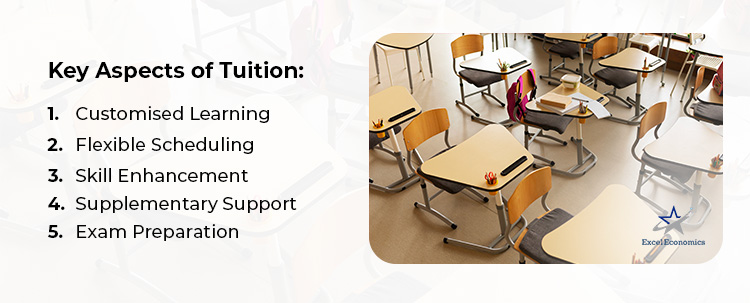
The Ultimate Guide to Economics Tuition
PART 1 – INTRODUCTION
In the ever-evolving realm of education, personalised assistance has become a contributor to students’ outstanding academic journeys. This form of support, commonly known as tuition, is offered outside conventional classrooms. Typically conducted in one-on-one or small-group settings, tuition spans a wide array of subjects, from fundamental disciplines like economics, mathematics and science, to specialised fields such as music, arts, and foreign languages.
By enrolling in tuition classes, students receive individualised attention and specific guidance based on their unique learning needs and challenges. Whether you are a student aspiring to ace your exams or a concerned parent seeking the best academic assistance for your child, tuition programmes are here to guarantee excellence.
PART 2 – THE BASICS OF TUITION
2.1 Key Aspects of Tuition
Understanding the main aspects of tuition is essential for students and parents aiming for outstanding academic results. In this section, we will delve into the core offerings that make tuition valuable.

1. Customised Learning
Acknowledging the different learning styles of each student is important in education. Tuition recognises this significance, with respective tutors skillfully customising teaching techniques. By identifying individual strengths and weaknesses, tutors employ multiple approaches that correspond to student’s preferred learning methods. The tailored guidance not only deepens students’ understanding of the subject matter but also instils confidence in students.
2. Flexible Scheduling
Tuition provides versatile scheduling options, enabling students to select class timings that match their hectic routines. Whether it’s a post-school session or a weekend class, students can adjust their timetable accordingly to enjoy uninterrupted learning.

3. Skill Enhancement
More than just academics, tuition also focuses on the holistic development of students. Some programmes integrate skill-based training with interactive exercises and real-life scenarios. These thought-provoking activities encourage students to analyse complex problems, offering heightened clarity on the subject matter. For instance, when studying a new tax policy in econs tuition, students analyse its effects on businesses, consumers, and the economy. They use data, economic models, and debates to understand the situation better. As a result, they enhance their critical thinking and problem-solving skills, equipping themselves with practical tools to navigate real-world challenges.
Learn more: Exploring the Application of Concepts to Real-World Scenarios Through Economics Tuition
4. Supplementary Support
While regular classroom teaching exposes students to new knowledge, tuition improves the learning process by reviewing and emphasising concepts taught in school. Advanced materials and topics help students to further discover complex ideas, fostering a more insightful understanding.
5. Exam Preparation
Navigating standardised tests and competitive exams can be daunting. That’s where tuition steps in to deliver the necessary knowledge and skills. In particular, tutors organise the syllabus to make it more comprehensible, boosting students’ confidence in approaching exams. This ultimately leads to improved results.
2.2 Measuring Success in Tutoring
Tutoring is a dynamic process that involves continuous assessment and modification. Employing effective assessment techniques can measure the impact of tutoring sessions accurately. Here’s how:

1. Tracking Academic Progress
Regular assessments, quizzes, and practice tests can be milestones in a student’s educational journey. By comparing grades or test scores before and after tutoring sessions, both tutors and students can visualise progress. For instance, if a JC Economics student obtains higher scores in the demand and supply topic but their performance in Macroeconomics tests remains stagnant, it indicates the need for targeted tutoring in the latter. Pinpointing these areas allows tutors to predict specific challenges the student is facing, adapting their tutoring methods to help them improve.
2. Evaluating Skill Development
In tuition, students’ skill development can be demonstrated through assignments. The assignments may include practical tasks that stimulate students’ critical thinking, or interactive discussions that encourage valuable insights. As tutors guide students to identify problems, pinpoint core issues, and formulate efficient solutions, they are given the opportunity to refine their problem-solving abilities.
3. Gauging Student Confidence
Confidence is the key to academic success. A confident student is more likely to actively participate, ask questions, and take on academic challenges.. By paying close attention to students’ reactions, responses, and level of involvement, tutors can gauge their interest in the subject matter. In this way, tutors can adapt their teaching methods to ensure an enriching learning experience.
Learn more: The Role of Economics Tuition in Enhancing Students’ Understanding of Key Concepts
4. Self-Assessment and Reflection
Cultivating self-assessment and reflection habits is an essential practice in tuition. After exploring weaker areas and setting achievable goals for future sessions, students can enhance their self-awareness to take full responsibility for their education. While it’s crucial to shape knowledgeable students, valuing the transformation into independent learners is equally important.
5. Parental and School Feedback
Regular communication and feedback from parents and school teachers create a cooperative support system for students. Parents reflect on the study habits of their children while school teachers’ comments on students’ academic progress and classroom behaviour can prove to be notable insights. Gathering these allows tutors to modify their teaching approach for different syllabi, including H2 Econs, and cater to specific academic challenges.
2.3 The Importance of Professionalism in Tutors
The professionalism of tutors plays a pivotal role in shaping students’ education and promoting their intellectual growth. Let’s discover how tutors uphold high teaching standards.
1. Role Modelling
The accountability and dedication of a professional tutor can leave a lasting impression on students and serve as a positive role model for them. Taking online economics tuition as an example, tutors who are well-versed in that subject impart both academic knowledge and vital life skills to students, preparing them for success in both their studies and future careers.
2. Adapting to Challenges
From poor time management to lack of motivation, challenges are often inevitable in the learning process. Nonetheless, professional tutors are agile in adapting their teaching strategies to meet these challenges head-on. The versatility also serves as an inspiration to students, demonstrating adaptability and providing support for each of them to overcome their academic hurdles.

3. Parental Confidence
Effective communication is the cornerstone of professionalism. Professional tutors maintain an open line of communication with parents, providing regular updates on their child’s progress. This transparent dialogue builds trust between parents and tutors. When parents are well-informed about their child’s progress, they are confident about the tutor’s expertise and the effectiveness of the tutoring sessions, developing a positive learning environment.
PART 3 – KEY INSIGHTS INTO ECONS TUITION
3.1. Navigating Exam Pressure
Economics poses a challenge due to its intricate concepts, often misleading students that excelling in exams is a challenging task. Thankfully, private economics tuition options exist, providing students with essential knowledge and skills, as well as the confidence to thrive under pressure.
1. Practice and Mock Tests
Economics tuition acts as a training ground for students to experience simulated exam scenarios, through practice tests and mock exams. The experiences are carefully designed to mimic the actual exam format, engaging students in answering difficult questions under time constraints in a controlled environment. As such, students learn how to stay calm and think clearly during high-pressure situations.
2. Effective Study Techniques
Economics tuition introduces students to effective and proven study techniques such as active recall, spaced repetition, and concept mapping. These techniques become their trusted companions, empowering students to navigate abundant information and grasp complex economic concepts with ease.
3. Building Confidence and a Positive Mindset
A defining feature of economics tuition is its transformative impact on students’ mindsets. Tutors, being both educators and mentors, have the ability to identify the strengths and weaknesses of their students. Giving meaningful feedback and sincere encouragement cultivates confidence in their learners. Fostering a positive mindset through both in-person and online economics tuition is an essential aspect of preparing students for success in their academic journey.
Learn more: The Impact of Economics Tuition on Exam Performance and Academic Success
3.2 Transforming Academic Performance
Excelling in economics also relies on the cultivation of effective study habits. Economics tuition contributes to enhancing students’ study techniques, facilitating noteworthy academic advancements. Considered a catalyst for academic transformation, econs tuition is closely associated with the following components:
1. Effective Time Management
Economics tuition guides students in managing their study time more efficiently. Based on meticulously planned study schedules, students are able to allocate their time across diverse economics topics, including the complexities of Microeconomics and Macroeconomics, understanding the nuances of Supply and Demand, and much more. Such a structured approach contributes to comprehensive coverage, apart from disciplining students to balance their academic commitments.
2. Goal-Oriented Study Plans
Establishing precise academic objectives is a core aspect of effective studying. With that being said, tutors work closely with students, assisting them in defining clear, short-term, and long-term goals. These goals are carefully dissected into manageable tasks, transforming complex concepts into accessible learning experiences. Moreover, a structured approach like this isn’t confined to standard economics tuition; it’s also adhered to in A-level economics tuition. In essence, minor achievements can propel students closer to their ultimate academic goals, on top of nurturing a profound sense of accomplishment

3. Insightful Note-Taking Methods
During economics tuition, structured note-taking methods are unveiled to help students comprehend complicated concepts. Given the extensive nature of the subject, identifying key points and reviewing materials is crucial. Tutors play an important role as they lead students in organising their notes systematically, supplemented with clear headings, bullet points, and concise summaries. Thanks to the methodical approach, raw information is transformed into coherent insights for better understanding. Additionally, the integration of visual aids like diagrams and charts facilitates quick review and revision.
3.3 Structured Study Schedule in Econs Tuition
Embarking on the journey of academic excellence demands more than just economics tuition sessions; it necessitates a dedicated study routine that complements your learning experience. Here are some tips for mastering economic concepts when attending econs tuition
1. Active Participation During Tuition Sessions
First and foremost, engage actively in your economics tuition classes. Participate in discussions, ask questions, and seek clarification on intricate concepts to delve deeper into the material. Well-arranged notes are also invaluable resources when it comes to self-revision. Therefore, organise notes to emphasise key points and fundamental concepts, whether it’s for your regular or JC economics tuition sessions.

2. Practice Problem Sets to Apply Theoretical Knowledge
Working on extensive economics problem sets reinforces your understanding. These sets distributed during tuition lessons should encompass both theoretical scenarios and numerical problems. Applying the concepts you’ve learned to practical problems improvesyour analytical skills, which in turn solidifies your foundation of topics.
3. Preparation for Future Tuition Sessions
Whether you enrol in JC or IB economics tuition sessions, adopt a proactive approach by preparing thoughtful questions derived from your self-study and past classes. Reflect on the areas where you find concepts challenging or topics that demand continuous review. Know your weaknesses and seek clarification from tutors to make the most of your tuition sessions.
3.4 Questions You May Have
1. Is Economics Tuition Only for Students Struggling with the Subject?
No, economics tuition is not solely for struggling students. It caters to a variety of learners, including those aiming for top grades, seeking more insights, or desiring exam-focused preparation.
2. Do Economics Tutors Help Students to Prepare for Exams?
Yes, economics tutors often offer exam-specific preparation. They guide students in understanding the exam format, practising past papers, honing problem-solving skills, and developing effective time management strategies.
3. Can Economics Tuition Improve My Grades?
Yes, economics tuition has the potential to improve your grades by providing personalised attention, addressing weaknesses, and enhancing your understanding of the subject.
CONCLUSION
Economics tuition extends beyond a supplement to classroom learning; it also becomes a key stepping stone toward a brighter future. Specialised sessions like IB, JC and H2 economics tuition offer tailored guidance, addressing specific challenges to curate a unique learning experience. With a solid groundwork established during these sessions, students are well-prepared for the challenges of exams and the demands of future endeavours, both academically and professionally.
Excel Economics is an education centre in Singapore offering comprehensive economics tuition classes in both group settings and individual one-to-one sessions. Dilys Lim, our esteemed Principal Tutor, has served as a supervisor for NIE Economics trainee teachers for over a decade.
Feel free to reach out to inquire about class availability and embark on your journey toward academic excellence.

